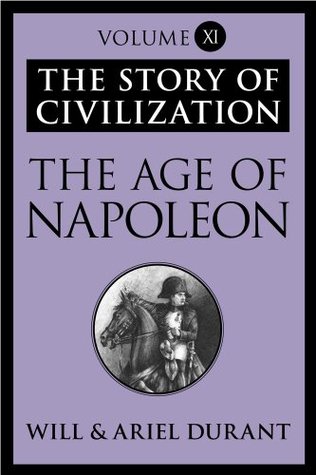More on this book
Kindle Notes & Highlights
by
Will Durant
Read between
November 15 - December 10, 2019
“enough to be within the whiff and wind of his genius for us not to possess our souls in quiet.”
To such a pass had come the mind that De Quincey had described as “the most capacious,… subtlest, and most comprehensive… that has yet existed among men.”
There was a strain of insanity in his heritage; he himself spent six weeks in an asylum (1795–96); and in 1796 his sister Mary Ann (1764–1847), in an insane mania, killed their mother.
“Southey has a little world dependent on his industry.”
“To have that poet’s head and shoulders I would almost have written his sapphics. He is certainly a prepossessing person to look at, a man of talent…. His manners are mild…. His prose is perfect.”
He had the defects of his virtues, for it takes much egotism to preach to mankind.
retired to a home in west England, where he was known as “the Nautical Lover” because he had a wife or a mistress in every port.
Captain John Byron (1756–91), father of the poet, crowded so many deviltries into his thirty-five years that he was called “Mad Jack.”
There he took expensive quarters, with servants, a dog, and a bear as room-mates. He patronized the local prostitutes and physicians, and occasionally sought more distinguished service in London.
Byron and Hobhouse left Malta on the brig Spider.
for (he told the poet) he knew him to be of aristocratic lineage by his small hands and ears.
Zoé mou sas agapo—“Life of my life, I love you.”
“The decay of three religions,” Hobhouse remarked, “is there presented to one view.”
He made friends readily, for he was attractive in person and manners, fascinating in conversation, widely informed in literature and history, and more faithful to his friends than to his mistresses.
Byron, who had rashly discarded any moral taboo that had not met the test of his young reason, wondered why he should not mate with his sister, as the Pharaohs had done.
hortatory
“he is a complete atheist, and he builds all his hopes on annihilation.”
He did not care for history, having taken the word of Voltaire and Gibbon that it was mainly the record of the crimes and follies of mankind;
He was not yet a vegetarian, but bread in one pocket and raisins in another seemed to him a well-balanced meal.
He had a poet’s moral code, naturally stressing individual liberty and suspicious of social restraints.
In the end the attempts of Wordsworth, Byron, and Shelley to find a benevolent friend in nature failed before its calm neutrality. Wordsworth surrendered to the Church of England; Byron and Shelley surrendered to despair.
“I stand a ruin amidst ruins,”
indulge in coition always”;
The Furies had little mercy on Shelley.
a “lyrical drama” is a contradiction in terms.
He brought with him into his new quarters two cats, six dogs, a badger, a falcon, a tame crow, a monkey, and a fox.
He was a baffling mixture of faults and virtues.
“My egotism seems inexhaustible.”
Because of their premature end Byron and Shelley have come down to us as Romantic poets, as very gods of the Romantic movement in England;
“Poets and philosophers,” he announced, “are the unacknowledged legislators of the world”:
in one jacket a volume of Sophocles was found in one pocket and a volume of Keats in the other.
Trelawny, at the cost of a burned hand, snatched the heart from the fire.
Shelley’s heart was given by Trelawny to Hunt, and by him to Mary. At her death in 1851 the ashes of the heart were found in her copy of Adonais.
The brain was one of the largest ever recorded—710 grams above the top range for normal men.
“Albé—the dear, capricious, fascinating Albé—has left this desert world! God grant that I may die young!”
He was not designed for popularity, with either the public or his competitors, but he was rarely without a rescuing friend.
“I am not wicked—Hot blood is my fault—my crime is that I am young…. Even though wildly surging emotions may betray my heart, yet my heart is good.”
In Vienna his stature (five feet five inches) invited wit, and his face was no fortune;
He was a misanthrope, judging every man basically base, but fondly forgiving his troublesome nephew Karl, and loving every pretty pupil.
He gave to nature the unquestioning affection that he could not offer to mankind.
He could laugh more readily than he could smile.
Minds are differently molded—some to feelings, some to ideas; it must have been as hard for Hegel to understand Beethoven as for Beethoven—or anyone—to understand Hegel.
—But she must be beautiful, for it is impossible for me to love anything that is not beautiful—or else I should have to love myself.
Life and reality are composed of inseparable opposites—good and evil, joy and sorrow, health and sickness, birth and death; and wisdom will adjust itself to them as the inescapable essence of life.
“Comoedia finita
Nationalism, large or small, grew as religion declined, for some creed-political or social—must hold a society together against the centrifugal egoism of its constituent souls.
It was one of Bonaparte’s maxims that “men are powerless to determine the future; only institutions fix the destinies of nations.”
Fulda’s monastic library fed the Renaissance with classical manucripts;
“Don’t get tall,” a mother cautioned her son, “or the recruiters will get you.”
He was the one man of his time who could outwit Voltaire and teach Napoleon.


